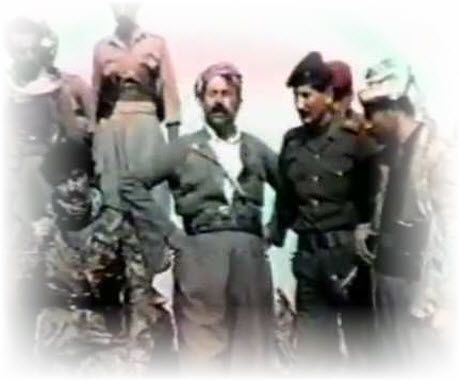Qasim Tahir Mustafa, also known as Qasim Agha of Koya, was sentenced to life imprisonment by a Sulaimaniyah court.
The trial was held in the Sulaimaniyah Criminal Court on Sunday, October 5, in an absentee hearing on the complaint of the relatives of a Peshmerga (Kurdish fighter).
"The case dates back to 1988, when Qasim Agha of Koya and his jash took the Peshmerga hostage and he died," a source who was present at the trial told KirkukNow.
"The judge issued the decision based on a complaint by the relatives of the Peshmerga and a video showing Qasim Agha Koya accompanied by an Iraqi army force and a number of Jash of the regiment took a Peshmerga hostage," the source said.
The prosecutor also filed charges against him and the trial ended with a life sentence for Qasim Agha of Koya.”
Jash is a Kurdish word which means donkey yet a term for a traitor or collaborator which cooperates with the enemy against the Kurdish people.
Kurds who became collaborators with the Iraqi government were referred to as Jash. The number of jash hit 150,000 in the 1980s as a method of avoiding military participation in the Iran–Iraq War. The Jash then realigned with the rest of the Kurdish people during the 1991 uprising, however all the Jash had not been completely forgiven. The commander of a Jash regiment was called Mustashar (advisors).
In the same video, which the KirkukNow checked and relied on as evidence for the judge's decision, another Peshmerga, who is not clear whether killed or wounded, is on the ground.
In the video, Qasim Agha and an Iraqi army officer with the rank of lieutenant interview the wounded Peshmerga and ask for the address of the house and neighborhood and the party that the Peshmerga contacted.
Qasim Tahir Mustafa Agha, also known as Qasim Agha of Koya, was a Mustashar for a Jash regiment opened by the former Ba'ath regime in the 1980s and is accused of helping the regime in the Anfal process during which 180,000 civilians were killed, mainly women and children, and some were buried alive in mass graves.
Although the Kurdistani Front, formed by Kurdish political parties late 1980s, issued a general amnesty for the Jash chiefs on condition that they surrender, Qasim Agha refused and remained in Baghdad until the fall of the Ba'ath regime in 2003.
The Iraqi Supreme Criminal Court issued an arrest warrant for him and dozens of complaints were filed against him in the Iraqi Kurdistan Region IKR courts, but he left Iraq and his current whereabouts are unknown.
The Kurdistan Regional Government KRG has recognized April 14 as the anniversary day of Anfal, which has also been recognized as an act of genocide by the KRG and its parliament as well as the Central Government in Baghdad.
In the IKR, out of 182,000, including the Barzanis massacred by the former Baathist Regime, only 2,500 corpses have been exhumed and reburied in an Anfal memorial in Chamchamal district of Sulaymaniyah province.





